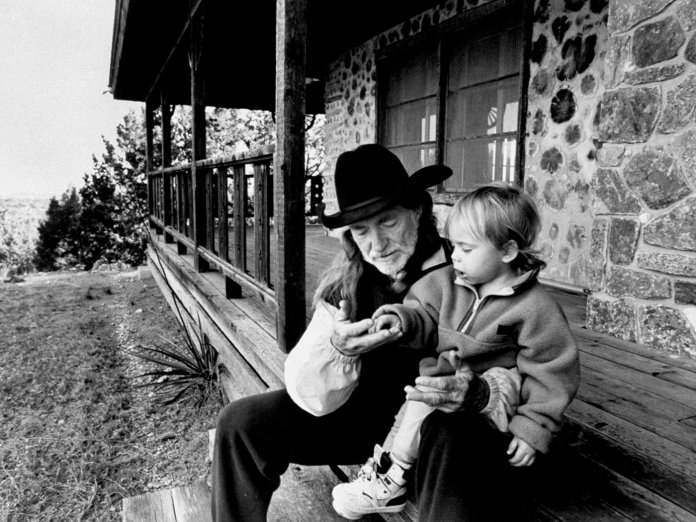A new five-part documentary, Willie Nelson & Family, digs into every chapter of his long and colourful life, in our APRIL 2023 issue of Uncut, available to buy here.
In the late 1960s, Willie Nelson spent $150 on a new Martin acoustic guitar that he named Trigger, after Roy Rogers’ horse. He still plays it more than 50 years later. It’s a story that’s been told many times, but it takes on new significance in Willie Nelson & Family, an upcoming new five-part documentary by co-directors Oren Moverman (The Messenger, Rampart) and Thom Zimny (Bruce Springsteen’s go-to film guy).
“I knew that story,” says Moverman, “but when Willie was telling it to us, he’d share a detail that went just beyond what you knew. And there was a musicality to his voice when he described buying Trigger – and then he’d say he bought a horse and some rope for the same price. Maybe you know all that from a book, but hearing him tell the story gives it some magic. That was one of the many surprises making the film, just the power of his storytelling.”
Willie Nelson & Family, which premiered at Sundance, delves deep into Nelson’s long life and career, allowing the man himself to tell his own story both through new interviews and archival footage. There’s a deep melancholy in his voice when he discusses his childhood in rural Texas, where he and sister Bobbie were raised by their grandparents. There’s no little frustration when he recalls his early professional struggles as a young songwriter in Nashville and no little regret when he describes his poor treatment of his first two wives. Spanning nearly a century, the documentary tells some new stories and sheds fresh light on old ones.
“We wanted to bring Willie from every decade,” says Zimny. “We wanted to bring his voice from the past. We didn’t want it to be a story about an old man looking back on his life. We wanted a 35-year-old Willie to tell us about the late ’60s, and we wanted a 55-year-old Willie to tell us about the ’80s. It took a lot of digging to get every chapter of his life into the story.”
Zimny is keen to stress that “Willie was completely open about everything”, including his divorces, his wild 1971 concept album Yesterday’s Wine, and even the shootout with his wayward son-in-law that inspired his 1973 song “Shotgun Willie”. “He encouraged us to take on the imperfections in his story. If Willie threw us a curveball – and he did that every day – we learned that we just had to embrace it and go with it.”
Nelson, who turns 90 this year, still tours frequently and releases several albums each year (next up in March is his new collection of Harlan Howard covers called I Don’t Know A Thing About Love). He rarely slows down, but when the pandemic forced him to take a breather, Zimny and Moverman flew out to his home in Maui for several long sessions of interviews.
“We stepped into something we called Willie World,” says Moverman. “We had something very rare, which was a Willie Nelson who was not on tour, who was missing the road, who was missing just talking with people. I think he was hungry to communicate and reflect. The road and the bus are home for him, and the audience is his family. Those became the themes for the film.”
Together, the directors present a nuanced portrait of Nelson as someone who keeps moving forward constantly, through tragedies as well as triumphs. “Willie said something really amazing that didn’t make it into the film,” says Zimny. “When he misses the road, he’ll just go out and sit on his tour bus. That summed up Willie World for me. Being on the road makes him happy, so he’ll just sit out there and pretend he’s going somewhere.”


